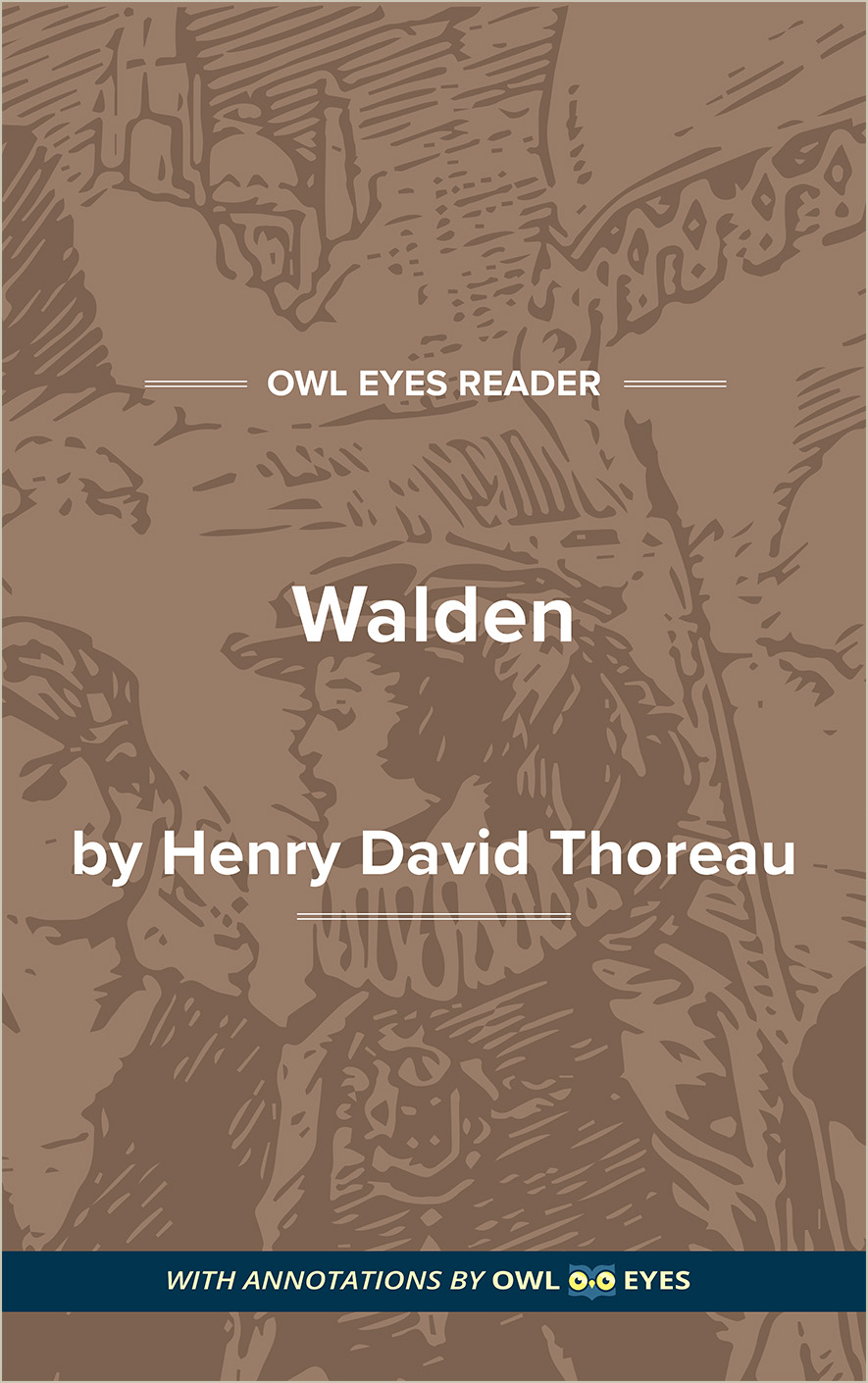Analysis Pages
Vocabulary in Walden
Vocabulary Examples in Walden:
Economy
🔒"simoom..." See in text (Economy)
"for the devil finds employment for the idle..." See in text (Economy)
"trumpery..." See in text (Economy)
"exuvioe..." See in text (Economy)
"shiftlessness..." See in text (Economy)
"the staff of life..." See in text (Economy)
"The reader will perceive that I am treating the subject rather from an economic than a dietetic point of view..." See in text (Economy)
"inveterate cavillers..." See in text (Economy)
"Tartar..." See in text (Economy)
"Arcadia..." See in text (Economy)
"have gone up garret..." See in text (Economy)
"and not detect the motes in his eyes..." See in text (Economy)
"chaff..." See in text (Economy)
"cant..." See in text (Economy)
"copper..." See in text (Economy)
"belles-lettres..." See in text (Economy)
"dilettantism..." See in text (Economy)
"The house is still but a sort of porch at the entrance of a burrow..." See in text (Economy)
"aguish..." See in text (Economy)
"the winter of man's discontent..." See in text (Economy)
"Fatherland..." See in text (Economy)
"publicans..." See in text (Economy)
"sties..." See in text (Economy)
"suent..." See in text (Economy)
"somersets..." See in text (Economy)
"hiring..." See in text (Economy)
"Yankee..." See in text (Economy)
"wore the bower..." See in text (Economy)
"Harlequin..." See in text (Economy)
"the Fates..." See in text (Economy)
"sinecure..." See in text (Economy)
"golden or silver fetters..." See in text (Economy)
"dross..." See in text (Economy)
"a sort of Elysian life..." See in text (Economy)
"New Hollander..." See in text (Economy)
"None of the brute creation..." See in text (Economy)
"as old as Adam..." See in text (Economy)
"a very ancient slough..." See in text (Economy)
"factitious cares and superfluously coarse labors..." See in text (Economy)
"old book..." See in text (Economy)
"its Augean stables never cleansed..." See in text (Economy)
"Iolaus..." See in text (Economy)
Where I Lived, and What I Lived For
🔒"point d'appui..." See in text (Where I Lived, and What I Lived For)
"Brahme..." See in text (Where I Lived, and What I Lived For)
"the steppes of Tartary..." See in text (Where I Lived, and What I Lived For)
"Spartan-like..." See in text (Where I Lived, and What I Lived For)
"Genius..." See in text (Where I Lived, and What I Lived For)
"itself an Iliad and Odyssey in the air, singing its own wrath and wanderings..." See in text (Where I Lived, and What I Lived For)
"and bathed in the pond; that was a religious exercise..." See in text (Where I Lived, and What I Lived For)
"conventicle..." See in text (Where I Lived, and What I Lived For)
"tarn..." See in text (Where I Lived, and What I Lived For)
"compensation..." See in text (Where I Lived, and What I Lived For)
"and be buried in it first..." See in text (Where I Lived, and What I Lived For)
"garret..." See in text (Where I Lived, and What I Lived For)
"chanticleer..." See in text (Where I Lived, and What I Lived For)
"Olympus..." See in text (Where I Lived, and What I Lived For)
"Cultivator..." See in text (Where I Lived, and What I Lived For)
"nawed..." See in text (Where I Lived, and What I Lived For)
"bounding..." See in text (Where I Lived, and What I Lived For)
"fallow..." See in text (Where I Lived, and What I Lived For)
The Village
🔒"taken in homoeopathic doses..." See in text (The Village)
The Ponds
🔒"alto-relievo..." See in text (The Ponds)
"Cœnobites..." See in text (The Ponds)
Higher Laws
🔒"heathen..." See in text (Higher Laws)
"intangible..." See in text (Higher Laws)
"Yankee..." See in text (Higher Laws)
Conclusion
🔒"alburnum..." See in text (Conclusion)
"Eulogies..." See in text (Conclusion)
"obsequious..." See in text (Conclusion)
"Let us not play at kittly-benders. There is a solid bottom everywhere...." See in text (Conclusion)
"tafferel..." See in text (Conclusion)
"cosmopolite..." See in text (Conclusion)

